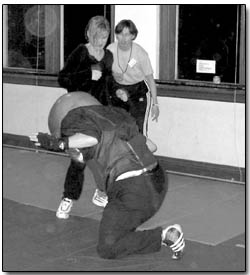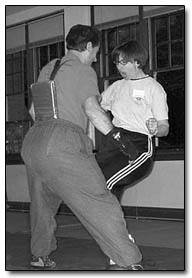 |
| Jennifer Reeder delivers
the crushing blow to her “assailant” during
graduation ceremonies for a Safe Passage workshop Saturday
night at the Smiley Building. |
No one has ever failed this class,”
Stephanie said.
“I’ll be the first,” I said.
It was 9 a.m. Saturday at a women’s self-defense class.
I’d been told that nine hours later I’d be in a
graduation ceremony where I would fight my way out of two assaults
– one standing and one on the floor. But in light of my
uncoordinated flailings in step aerobics, I wasn’t so
sure I’d be able to fight off a male assailant, no matter
how good the training.
But our three instructors from the Westminster-based Safe Passage
Workshops – Stephanie Pulhamus, Dennis Warren, and Stephanie’s
husband Dick – eased the 13 of us into the day slowly.
Stephanie explained that we would learn five to seven basic
moves for self-protection, because when adrenaline is pumping,
it is only possible to remember a few things. But because of
the simplicity of the moves, we would be able to remember them
years from now, she said. In fact, she told me about a former
Safe Passage student in her 70s who was attacked and sent her
assailant to the hospital with two broken insteps, a bruised
groin, a broken nose and a concussion. The woman told police
she couldn’t remember what had happened during the attack
except to mention she had taken a self-defense class about 10
years prior.
“It’s for all ages, all shapes and sizes, all health
levels,” Stephanie said. “It’s about using
whatever is available.”
This certainly seemed true of my classmates. Participants ranged
from two DHS seniors preparing for college to women working
through past traumatic experiences. One woman said for years
she had been in an abusive marriage, which had since ended.
Since then, she spent time running with her dog. But her dog
died last month, and without the feeling of safety the dog provided,
she hadn’t been able to run anymore. She was hoping the
class would give her the courage to resume her pastime.
Stephanie said many women who have experienced traumatic relationships
and assaults take the class, and although they won’t be
cured of their fear, they can make it their ally. Women can
learn to use fear to take action rather than freezing in an
assault. She said the class often is therapeutic because women
can “go back to the traumatic experience and put a different
ending on it.”
 |
| Class instructor Stephanie Pulhamus uses
a knee to the groin in a self-protection exercise against
fellow instructor Dennis Warren./Photos by Bryan Fryklund. |
The class started preparing for attacks by learning some key
moves focused on the head and groin, since those are the body’s
two most vulnerable areas. Once the basics were established,
it was time to face the “muggers” – Dennis
and Dick in the patented armor and huge, padded helmet.
The first fight was verbal, because 70 percent of assaults
have a verbal component, Stephanie said. She pointed out that
many assaults can be avoided by being assertive and using a
loud voice to say things such as “Back off,” “I
don’t know this man,” and “No,” since
muggers and rapists often look for an easy target. However,
she stressed that while assertiveness could prevent a fight,
aggression, such as swearing or pointing, could escalate the
situation.
As women revisited past experiences while shouting down potential
attackers, the adrenaline pumped and tears flowed. Stephanie
held the participants’ hands as they walked out onto the
mat. As we’d been told, the “muggers” were
no longer our patient instructors, Dick and Dennis – they
were assholes.
When it was my turn on the mat, the mugger approached saying
something about my lips. I “anchored” in my protective
stance and yelled at him to back off, but he grabbed me, and
I had to knock him in the head and knee him in the groin and
head before he went down. I thought I was done, but I looked
up to see the other mugger coming at me. I was so charged with
adrenaline that I heard myself gesturing to the horizontal mugger
and yelling, “You want some of this?” I’d
crossed the line from assertive to aggressive and had to fight
my way out of a second assault.
Another round involved being attacked from behind. One participant
began crying upon entering the mat and being told to turn around.
“I can’t do it; I can’t have someone come
at me from behind,” she said through tears as one of the
muggers began circling and taunting her. But as we watched,
she turned and opened up a can of whoop ass on her assailant.
A similar scenario unfolded with the woman who hadn’t
been running since the death of her dog. As the mugger started
toward her, taunting her about her dog, she was clearly shaken
but fought him off like a tiger. And so went the rest of the
class: women overcoming fears and inspiring the rest of us.
According to Stephanie, the class was called “Women’s
Journey” because at the end of the day, participants have
taken a journey of self-discovery. And after watching women
reclaim their voices and rise above deep-seated fears, I was
inspired. Instead of feeling like a media spy, I was now a member
of a group on an emotional journey.
Perhaps one of the more difficult of the assaults was the simulated
rape, which placed women face up or down on the ground –
sleeping in a tent, lying on the beach. As a mugger pounced
on one of the high school girls, she flipped him over, beating
the hell out of him with one of my favorite moves, the “axe”
kick. When it came my turn, I don’t remember what my attacker
said, because the adrenaline was so strong that I couldn’t
even hear the fighting moves my classmates were yelling from
the sidelines. Face down, I planted a foot and used what my
mother always called “great child-bearing hips”
to toss him off. I lost a shoe, and my right knee now has a
bruise from a misplaced shot to the groin, but afterward, I
stood up safely to “look” around for more attackers,
“assess” his condition and run to the back of the
line to cheers of my classmates.
Afterward, as we watched a tape of the fights, there was more
cheering and encouragement. We felt united as we headed down
to “graduation,” to which friends and family were
invited. With the stage fright kicking in, I soon found myself
facing a sneering mugger. “Oh, I know you. You’re
that newspaper chick,” he snarled. I’m told I kicked
his ass.
After our final exercises, we formed a circle, while expressions
such as “I feel so connected to you all,” “I
don’t want to forget this” and “Thank you
all so much” were exchanged. When the circle was enlarged
to include family and friends, the woman whose dog had died
told the circle that because of the class, she was now able
to admit that she had been in a violent relationship.
“I’m so glad you’re writing this article,”
she’d said to me. “Women need to know about this.”
We knew Stephanie would ask if we wanted to say “yes”
or “no,” as we had several times throughout the
day. “Let’s say ‘Yes,’” someone
suggested. And the circle began to say yes to things like empowerment,
family and safety, while a sweaty Dennis piped in. “Yes
to Ibuprofen,” he said. n
For more information on Safe Passage,
go to www.safepassagenow.com.

